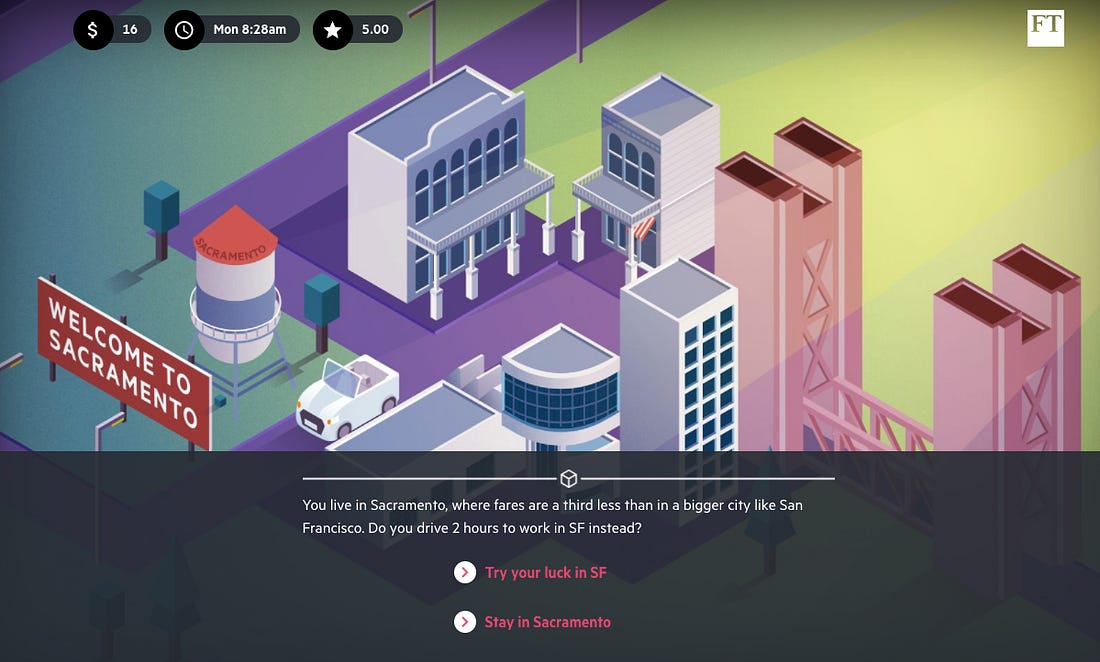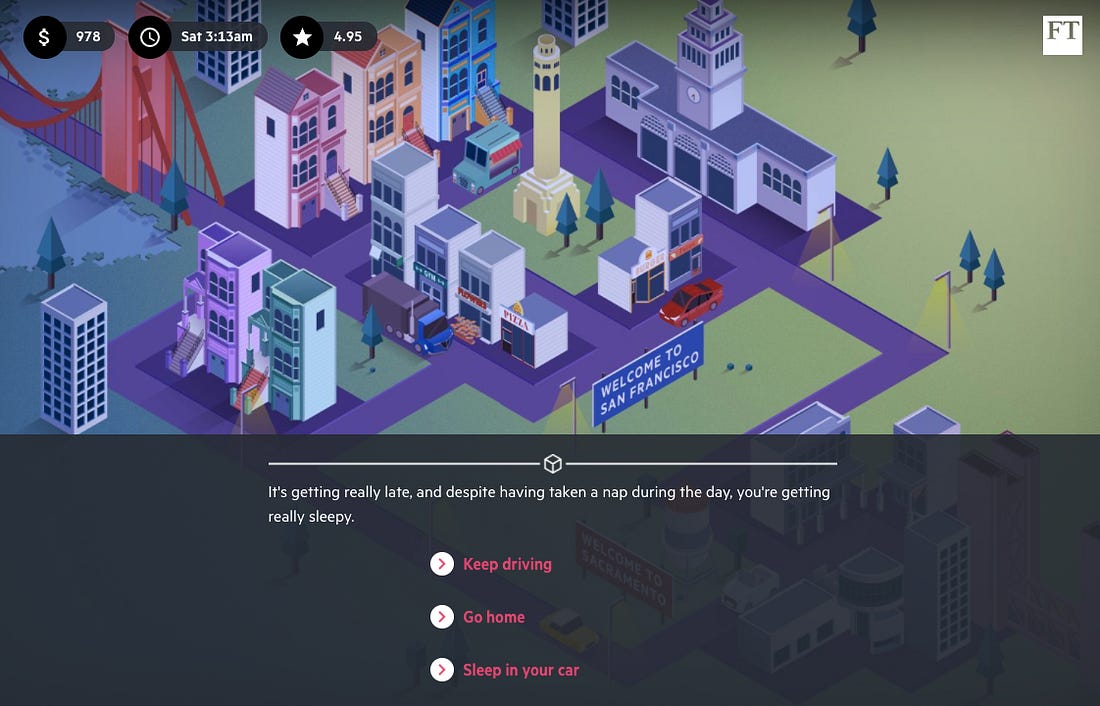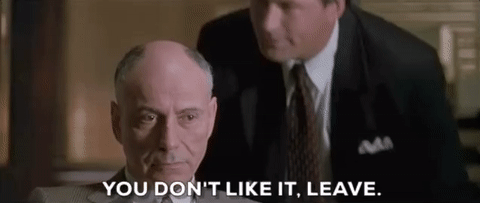The Uber game.
I recommend everyone try out "The Uber Game" from the Financial Times, which simulates what it's like to be an Uber driver. It's a choose-your-own-adventure story for the "gig" economy, where you're the Uber driver and every choice determines whether you make enough money that week to pay your mortgage. Those choices include the car you lease, the supplies you buy for it, the hours you choose to work, and the friends and family members you choose to ignore. In the easy version of the game you live in San Francisco and have good credit; in the hard version you live in Sacramento and your credit is poor.
The FT built its game with help from Christian Perea, a blogger at driver website The Rideshare Guy. It runs through some of the most common dilemmas drivers encounter: whether to pick up a vomiting passenger, whether to go home or keep driving late at night, whether to "chase the surge."
We've talked before about how Uber uses incentives like surge (higher prices for higher demand), boost (guaranteed higher fares), and quest (complete X rides in Y hours to earn $Z in bonus) to keep its drivers logging on. The FT simulation is clever because it requires no embellishment. Uber and other gig economy companies already gamified the work experience. The FT shows us how.
Checking out.
Elsewhere in gig economy realities, here is a new version of an old story from the Buffalo News, "Instacart loses allure for workers":
As more independent contractors have signed on, orders have slowed to a trickle some days, shoppers said. Shoppers can sit in their cars for hours and not get a single order, or have their shifts cut early because there aren’t enough orders to go around. And no matter how fiercely shoppers defend their stats, shopping quickly and accurately, and trying to give great customer service, they keep getting dinged for things out of their control, they said.
The pain points are familiar: customers who make false complaints, scheduling changes that favor full-time workers, Instacart taking away its hourly guarantees and incentives. "One shopper, Brunhilda (not her real name), said she used to love shopping for Instacart… but earnings decreased from $415 to $265 in a single week, even though she's working the same hours."
Instacart has been expanding aggressively this year since raising $400 million in series D funding in April. It's partnered with a lot of new grocery stores and launched in a bunch of new cities. Instacart is a national service but its operations are highly local. One consequence of that is that it can reuse the same playbook in city after city, hiring people initially with lots of jobs and guaranteed wages, and then disappointing a new population of workers like Brunhilda (not her real name) when it takes those incentives away.
Meanwhile Costco is expanding its partnership with Instacart but also building out its own two-day delivery service, "CostcoGrocery." Instacart started as a consumer-facing service but lately has pitched itself to brick-and-mortar stores as the company that can bring them into the future. This pitch got a boost from Amazon's June acquisition of Whole Foods, which spooked a lot of grocers and made working with Instacart seem a lot more appealing. The risk now is that some of Instacart's biggest clients, like Costco, decide they don't need Instacart and are better off investing in their own delivery infrastructure. In the long run it's almost always better to cut out the middleman.
Parking rules.
Running a "sharing" economy company requires a certain amount of faith in humanity. Uber had faith that it could get normal people to drive around other people without too many accidents and deaths. Airbnb had faith that it could convince families and casual travelers to stay in residential homes instead of hotels. Dockless bike share companies have faith that people will park their bikes in reasonable locations.
Two weeks into its dockless bike share experiment, Washington DC is less sure:
They have been spotted badly parked against poles and trees, left strewn in the middle of sidewalks. Blocking home entrances. Taking over Capital Bikeshare docks.
The National Park Service has seized more than a dozen found abandoned inside memorials, sidewalks and parking lots.
Four dockless bike share companies are testing their services out in DC: Mobike, Spin, LimeBike, and Jump. Each company has been allowed to put 400 bikes on the ground. It's up to the companies to make sure riders park bikes in appropriate places and also don't vandalize them. "Spin continues to strongly encourage riders to park legally," says Spin CEO Derrick Ko. "We recognize there will always be folks that want to abuse the system for one reason or another, but most of the time that wears off quickly," says a Mobike spokeswoman.
I am intrigued by this idea that bad behavior is a result of novelty more than anything else. It's fun to leave dockless bikes in random places now but after a few months it will be less fun and so people will only park them in the most legal and reasonable of spots. In Seattle, where dockless bike share has been live since mid-July, the novelty of putting bikes where they don't belong still has yet to wear off. Look, a LimeBike in the sky!
Prom time.
The prom was Travis Kalanick's favorite metaphor for an initial public offering. "We're like eighth graders; we're in junior high, and someone is telling us that we need to go to the prom, and it's just a little early," he said in 2015. Last year Uber was an "early high schooler." Kalanick has also said, "We are going to IPO as late as humanly possible. It'll be one day before my employees and significant others come to my office with pitchforks and torches. We will IPO the day before that. Do you get it?"
Perhaps the starkest sign then that Uber has entered a new regime under Dara Khosrowshahi is that the company has set a 2019 deadline for its IPO. That was one of the terms reached under a deal with SoftBank last week, which also include a $1 billion to $1.25 billion direct investment from SoftBank, a secondary purchase of 14% to 17% of outstanding Uber shares at a discount, changes to the voting structure on Uber's board (one share, one vote), and an expansion of the board from 11 members to 17.
Those changes are all contingent on the SoftBank deal closing and, because this is Uber, it's an open question whether that will happen. The Financial Times reportsthat major Uber shareholders including Benchmark are throwing a wrench into the deal by declining to waive their right of first refusal until they see the price of the deal. If the price is low enough, some of those shareholders might decide to buy stock, instead of sell. Of course because Uber is technically still a private company, albeit with a potentially 17-member board and an upcoming stock auction, and because the normal laws of mathematics do not apply to privately held technology companies, the fact that major shareholders are getting ready to haggle over its secondary stock price doesn't technically devalue Uber, since SoftBank is making that direct investment of $1 billion to $1.25 billion at its last disclosed valuation of $68 billion, even if the rest of its shares are selling for much less.
Other stuff.
Gobble raises $15 million in series C financing for quick meal kits. Chinese Airbnb rival Tujia raises $300 million for overseas expansion. Tujia eyes Japan. Accor bids $920 million for Australia's Mantra Group. Jessica Alba's Honest Co. is no longer a unicorn. UrbanSitter raises $17 million. Ola raises $400 million from Tencent. London-based Laundryheap raises £2 million in "super angel" funding. How Uber Secretly Lobbied for Women to Drive in Saudi Arabia. Uber reaches $20 million settlement over unsolicited text messages. Uber plans appeal in London. Uber's iOS App Had Secret Permissions That Allowed It to Copy Your Phone Screen. Prepared meals company Bakkavor plans IPO. Real estate services for the "other 80%." Driverless cars are much too cautious. Driverless tech startup Naruto hires execs from Microsoft and Waymo. GM's Cruise acquires sensor startup Strobe. Amazon tests new delivery service. HelloFresh plans $1.8 billion IPO. Walmart acquires Parcel to launch same-day delivery in New York. Jet.com is finding its footing under Walmart. Hotels get into experiences. Las Vegas gunman rented homes on Airbnb. What tight security looks like at the world's hotels. Activists march against Airbnb rentals in Boston. Airbnb partners with WeWork on business travel. Russia and Saudi Arabia plan $1 billion technology fund. Self-driving car startup runs tests in retirement community. Dreamy Wes Anderson-themed home on Airbnb. Techapella. Pizza robots.







